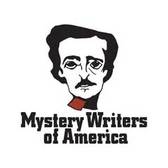 In a few hours I'll be flying to New York City to take part in the Edgars Symposium. My third novel, THE MASQUE OF A MURDERER is up for the Simon & Schuster Mary Higgins Clark Award. Hopefully, my flight will be on time because I am looking forward to participating in this panel: "A Dram of Poison." Glen Erik Hamilton (2016 Best First Novel Nominee – Past Crimes, William Morrow) and Lori Roy (2016 Best Novel Nominee – Let Me Die in his Footsteps, Dutton). Moderated by Brendan Dubois (MWA National Board member) On Thursday night, the winners will be announced...it is truly an honor to be nominated, alongside A Woman Unknown by Frances Brody (Minotaur Books – A Thomas Dunne Book), Night Night, Sleep Tight by Hallie Ephron, The Child Garden by Catriona McPherson (Llewellyn Worldwide – Midnight Ink), and Little Pretty Things by Lori Rader-Day (Prometheus Books – Seventh Street Books). Can't wait!!!
2 Comments
I'm delighted to be joined on my blog today by author Elena Hartwell. Elena writes a great series that features a private investigator, and I was curious how she does her research to make her books (and detective) authentic. 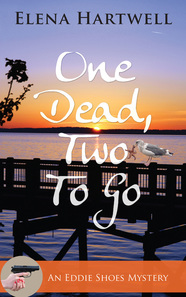 I have a very eclectic work history. I’ve been an auto mechanic and a university professor. I’ve stage-managed children’s theater and one illustrious summer I delivered phone books. What I have never done, is work as a private investigator. So what do I write? A mystery series about a private investigator. Nothing ruins a story more than having a character do something that you know they would never do in the real world. The downside of being an author is a whole lot of your readers know more than you do about an aspect of the world you’re creating. The upside is a whole lot of people in the real world love to talk about their areas of expertise. To research for One Dead, Two to Go, I used a wide variety of methods. I read PI Magazine, a trade magazine for the industry. I read non-fiction books by private investigators, which gave insights into the real world of investigations. And I’ve asked private investigators about specific questions that came up during a draft. My most useful resource has been a police detective with the Issaquah Police Department. Incident Commander Diego Zanella has been incredibly generous with his time. The best part of my experiences interviewing him is he doesn’t just answer my questions he also makes suggestions about things I haven’t even considered. His insights and ideas have been instrumental in the shape of books one and two, and I will be meeting with him about book three. My process is to write the full draft of the book. Then I read through it and highlight every place where I have a specific question about how homicide investigations work in the real world. Then I sit down with him and go through my scenarios, jargon, legal issues, and how people behave — in his experience — in various situations. I love it when he says, “You’ve got that exactly right,” but I learn a lot more from, “Well … no … it doesn’t exactly work that way.” Then I go back through and rewrite for accuracy. Usually these changes are minor, but sometimes it requires a major fix on my side. Changing a location for a scene or the outcome of an interaction or the behavior of a character. We try to keep my protagonist from out and out breaking the rules, but we happily let her bend some. It is, after all, fiction, and that means we get to have a little fun. Usually a few more questions come up after I do the rewrite and I meet with him again. Everyone I’ve ever interviewed in all my years as a writer has been generous with their time and knowledge. Prior to becoming a novelist, I worked as a playwright. I’ve written extensively about areas in which I have no personal experience: veterans, PTSD, combat, colony collapse disorder, dementia, and once a glass factory in the Midwest. For each of these projects I visited locations where my work was set to get the full flavor of the landscape. I spoke to experts in their fields, American veterans from Viet Nam and the Middle East, journalists covering the wars in Iraq and Afghanistan. I read a lot of non-fiction in the topics I’m researching. I also have experts read early drafts for accuracy. For book two, Two Dead Are Better Than One, I’m researching some specific psychological conditions, and I’m very lucky to have two beta readers who worked as therapists for over fifty years combined. Insights from people in the field are invaluable, not just for fact checking, but also to give you paths to travel down you didn’t even know could be on the map. Research before and during your writing process, that’s my suggestion. Before, to get you started and during, to fact check as things arise. But at some point, you also have to trust you’ve done what you can and let it out into the world. You will probably make a mistake, everybody does, but a reader who loves your work will still enjoy your book. And it gives them something to talk to you about at your next book signing. 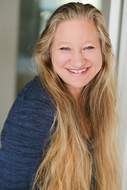 Elena Hartwell worked in theater as a playwright, director, producer, and educator before turning her attention to fiction. Her Eddie Shoes Mystery Series starts with One Dead, Two to Go. Followed by Two Dead Are Better Than One and Three Dead, You’re Out. Elena lives in North Bend, Washington, with her husband, their dog Polar, and cats Jackson and Luna. She loves to spend time with her hubby and their horses Chance and Jasper, the world’s greatest Arab and the best Palomino Paint on the planet. For more information, please visit www.elenahartwell.com
 Qumran (Source: Israel National Parks) Qumran (Source: Israel National Parks) Research is such a Siren… Okay, I’ve never lashed my body to a mast and filled my ears with beeswax before firing up the laptop (in the old days, it was easier to build dramatic tension if you were striding up the stairs toward the wooden doors guarding the entrance to your local library, like hometown cousins of Scylla and Charybdis), but I have thrown myself off a cliff into the adventure of discovery – sometimes just for the sake of learning! I’m not talking about looking for relevant statistics for Professor Cudlip’s “Theory of Infinity” course, either. I’m talking about feeling the burn in your frontal lobes, counting your pulse up to 200-plus beats per minute, experiencing the joys of carpopedal spasms. There’s something forbidden, even illicit, about digging into history. You might know where you will start your explorations, but you have no idea where you will end up. Perhaps I’m a voyeur by nature…or an eavesdropper…or just a busybody, but the headlines of 2016 (ISIS, Republicans, North Korea, Wall Street), in my opinion, pale beside the questions lurking in the shadows of history (Did Oswald act alone? Did FDR know the Japanese plans to bomb Pearl Harbor? Did Stalin poison Lenin?) Or perhaps I’m a conspiracy theorist… I know for sure that I am a schizophrenic. I must be…I write under two names. M. A. Richards is the author of a spy novel series featuring Nathan Monsarrat, a former deep cover operative with the CIA – the first novel, CHOICE OF ENEMIES, launched in January 2016 while the second offering, A THOUSAND ENEMIES, will be available in November 2016 (both published by Sunbury Press). I also scribe historical fiction as A. M. ben Yitzhak. Currently, I’m conducting research on the Zealots, the group of breakaway radicals who fled Jerusalem during the Roman rule of the Second Temple Period to live a more pure life in the barren Judean wilderness…and fought the Empire to a standstill from 66 to 132 AD, when the last of the Zealots, led by Shimon bar Kochba, bled to death in the desert south of the Dead Sea. To conduct historical research on a secretive group that lived two thousand years ago demands familiarity with the writings of the period…so, you need (1) access to the original materials (if you ever ask the Israel Museum to borrow the original – not digital - Dead Sea Scrolls for a few days, you’ll hear a really rich laugh) and (2) you need to read Latin, Accadian, Aramaic, and a few other “dead” languages. I suppose you could trust someone else’s translations, but then you are dependent on someone else… There is another roadblock, which might be a blessing, the more I think about it: so few original texts were written two thousand years ago. I can rely on the aforementioned Dead Sea Scrolls, Josephus, and other apocryphal writings (e.g., the minor prophets), but the scholarship of this period is severely limited and, unless you’re on a first name basis with the Witch of Endor, it would be tough to interview Judas of Gamala, Simon bar Giora, Menahem ben Judah or any of the other original kana’im and siqari’im – the founders of the Zealots. A third difficulty refers back to the opening of this epic…research is such a Siren! It’s addictive! Impossible to stop! I can’t tell you how many times I shut down the stacks in local and university libraries. At least, the internet never sleeps, but unless you induct your spouse into the Eleusinian Mysteries, chances are good that the time you spend researching the daily habits of the Zealots will do nothing for your marriage and family life. Faced with so many challenges, what’s a historical novelist to do (and I’m not talking about agents and editors shaking their heads and informing you that the market for Zealot fiction is incredibly, infinitesimally tiny)? Travel! Read the State Department warnings…and ignore them. Listen to your family and friends…and ignore them. Read the newspapers and watch the twenty-four cable stations…and ignore them! You wanna write about the Zealots? Go to their home. Stomp around their ancient stomping grounds. You probably will not discover a missing cache of Dead Sea Scrolls in the unexplored caves of Qumran, but you will absorb the zeitgeist of the period as you stumble over sandstone boulders, tread on red desert poppies, and quaff liter after liter of tepid water beneath the broiling desert sun. You don’t have to go the fully Monty, either…you can sleep not in a tent beneath clear, star filled skies but in an air conditioned hostel that offers hot showers and a fantastic breakfast of yoghurt, cheese, olives, bread, fruit, and vegetables. After a few weeks of following in the footsteps of the Zealots, you will have collected enough ambiance to fill the pages of a historical novel and a wonderful appreciation for the amenities of the twenty-first century. When you’re back home, having made amends with your spouse, family, and employer, when you’re sitting in front of your laptop with English translations of Josephus and the Dead Sea Scrolls piled on your desk, when you launch your fingers against the monolithic blank digital page…you will always have your best ally by your side: your imagination. After all – it’s not history. It’s historical fiction.  M. A. Richards is the author of the Nathan Monsarrat international espionage novels. Born in Lowell, Massachusetts, he received his Bachelor of Arts degree in Theater Studies from Connecticut College and his Master of Arts degree in English from the University of Massachusetts at Amherst. During a career as a Cultural Attaché in the Department of State that spanned more than two decades, he served in Baghdad, Jerusalem, Lagos, Moscow, Seoul, Tel Aviv, and Washington, D.C. He also served at U.S. Pacific Command in Honolulu as the Special Advisor to the Commander. He speaks Arabic, Hebrew, Korean, and Russian. M. A. divides his time between Palm Beach and Tel Aviv, where he indulges his passions for motorcycles, photography, and archaeology. Visit www.MARichardsBooks.com to learn more about M. A. Richards and CHOICE OF ENEMIES. 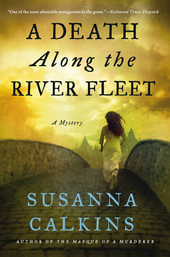 I'm often asked about how I write my books, whether I outline them first or just start writing. But really my books come to me in a series of images and then questions, which I then seek to answer. For A DEATH ALONG THE RIVER FLEET, the image that came to me is essentially what has been portrayed on the cover. The image was of a disheveled woman, barefoot and clad only in a simple shift, covered in blood that was not her own. In my mind, she had no memory of who she was, or what had happened to her. But that's where the questions started.... First, I needed to think about where Lucy could encounter her that was plausible. I thought maybe on the London Bridge, but the Bridge had been damaged by the Great Fire, and I didn't think Lucy could be walking in that direction. So I thought about other options, and ended up having Lucy encounter the woman on Holborn Bridge, by the rancid River Fleet when out delivering books. Then, I began to think about what Lucy would do when she found the woman--how would she react? Lucy, being Lucy, decides that she can't just leave this poor afflicted woman to the devices of suspicious townspeople, and takes her to a physician she knows. And then that led to more questions. What would a more educated person think about the woman's illness? What kind of healed wounds might the woman have, under closer inspection? How could they learn the woman's identity--what kind of clues could be on her person? And of course lastly--whose blood was on the woman? Those are the types of questions that I would ask myself, to keep my story moving forward.... If you are interested in reading an excerpt, you can see how these questions involved into the story at the heart of A DEATH ALONG THE RIVER FLEET. I've been writing my blog for about four and half years now, as sort of a side project to talk about history, mystery, writing, and of course my books. But it never really occurred to me that the practice of blogging may actually be helping me in my writing. That is, until I read the post by my guest blogger today, playwright and author Nina Mansfield. Her debut novel, SWIMMING ALONE, was released in 2015. Here she talks about what she's learned from blogging, and the impact it has had on her writing and writerly life. 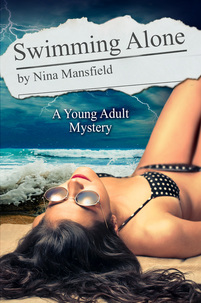 From the official blurb: The Sea Side Strangler is on the loose in Beach Point, where fifteen-year-old Cathy Banks is spending what she thinks will be a wretched summer. Just when she begins to make friends, and even finds a crush to drool over, her new friend Lauren vanishes. When a body surfaces in Beach Point Bay, Cathy is forced to face the question: has the Sea Side Strangler struck again? I know, I know…blogging is writing. But until I took up blogging about a year ago, I really didn’t think it was. Writing novels, plays, short stories, now that was “Writing.” But blogging? I wasn’t so sure what it was exactly. So first off, I would like to admit here, publicly, that I was 100% wrong about blogging. During this past year of constant blogging, I have learned that blogging is absolutely writing. Since I’ve become a blogger myself, I’ve also started to read many more blogs, and I could not have more respect for my fellow bloggers. That said, I really think blogging has helped me with my other writing projects as well. For a while, I thought it might be a distraction- something that would take me away from the “real” work at hand. The truth is, creativity begets creativity. Here’s the thing, sometimes I have thoughts running through my head that don’t belong in a mystery novel or in some quirky ten-minute play (the things I tend to write.) Like this piece I am writing right now. I mean, can you imagine, the detective finds the body, and then devolves into a rant about…why blogging is great? It just wouldn’t work. But a blog about blogging, now that’s a perfect fit. Blogging has forced me to write. My readers (and I am pretty sure I have at least two regular blog followers), expect content. And once I got into the habit of actually getting my thoughts down (about theater, books, and topics related to crime solving, etc., the focus of my blog), well then, it got easier and easier to sit my butt in the chair, and get my blog written. And you know what? The more I get my butt in the chair for this blogging thing, the more I get my butt in the chair for all that other writing as well. Blogging has taught me to meet deadlines. OK, so often these deadlines are totally self-imposed. But they are still deadlines. And I have actually been really tough on myself about keeping them. And when I am writing a guest blog (like this one) there are often real deadlines to meet. I don’t want to let down my host. Blogging has forced me to write quickly. And I don’t mean just because I am pressed for time, and because I tend to give myself unreasonable deadlines. I mean I have really taught myself to get the words on the page and hopefully make them not horrific, pretty much as soon as I’ve come up with a topic. Blogs are often powerful because they are timely. For example, when I attend a writing conference, I want to write about it as soon as the conference is over. Because, guess what? Chances are, no one is going to care in week or two. People move on. I can’t dilly dally. (That novel I’ve been writing for five years…well, that’s another story.) Blogging has taught me to be less precious about my writing. In part, because of the deadlines and the shelf-life of a blog, but also, because I have to move on and get the next thing written. I mean, yeah, I want everything I write to be perfect. But that isn’t always going to happen, and that’s OK. Writing is better written than unwritten (at least most of the time). Blogging has helped me “meet” and learn from a whole bunch of really fabulous other writers. I’ve been welcomed by so many authors onto their blogs, and I’ve also had the opportunity to host 40+ writers on my own blog during the past year. And you know what? Writers are the coolest people. They have awesome stories to share about what inspired them and where they get their ideas. They tell you about the books they’ve written and are writing. And since I love to read and I love to write, well, I’m pretty stoked to have made a whole bunch of new writer-blogger-author buddies, even though most of them are just virtual friends. Occasionally, I get to meet some of these awesome new buddies in person. And that is just the best. You know, Nina, I completely agree~ Thanks for being on my blog!  Nina Mansfield is a Greenwich, Connecticut based writer. Her debut novel, SWIMMING ALONE a YA mystery, was published by Fire & Ice YA in 2015. Her blog, NOT EVEN JOKING, just celebrated its first birthday. Her plays have been published and produced throughout United States and internationally. Her graphic novel FAKE ID: BEYOND RECOGNITION, illustrated by Leyla Akdogan, will be out with Plume Snake in 2016. Nina’s short mystery fiction has appeared in Ellery Queen Mystery Magazine and Mysterical-E. She is a member of Sisters in Crime, Mystery Writers of America, International Thriller Writers, Society of Children’s Book Writers and Illustrators and the Dramatists Guild.
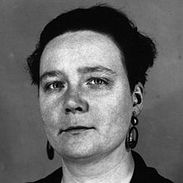 Dorothy Sayers Dorothy Sayers Recently* I came across the Detective’s Oath, written by Dorothy Sayers and first administered by G.K. Chesterton, as part of the initiation ceremony for the British Detective Club. The club, created in 1930, included the likes of Sayers, Agatha Christie, and a slew of other Golden Age mystery writers. The oath was this: “Do you promise that your detectives shall well and truly detect the crimes presented to them using those wits which it may please you to bestow upon them and not placing reliance on nor making use of Divine Revelation, Feminine Intuition, Mumbo Jumbo, Jiggery-Pokery, Coincidence, or Act of God?” While I think we’ve all seen authors—well-known ones at that—break these principles regularly (after all, why can’t a ghost solve a crime? Or for that matter, a cat?), there was something to these expectations that made sense. A reader should be able to work out whodunit, at least after the fact, to be fair.  But when I first read the oath, I had to laugh. I have situated my mysteries in early modern England, a time when divine revelation, providence, acts of God (or the Devil, for that matter) often served as the explanation for most mishaps and misfortune. It would have been so easy—and realistic—to have my sleuth solve crimes in that fashion. After all, there are many incidences of a community “solving” a murder when a corpse’s finger pointed to its murderer. Or when the corpse’s eyes would open and stare in the direction of the murderer’s house. There are even examples of a corpse bleeding from the nose or ears, indicating that the murderer was in the vicinity. Sometimes, logic and reason and evidence would prevail and sometimes…they did not. There are many examples of superstitions, hearsay, and feelings making their way into court testimony, especially in ecclesiastical courts. 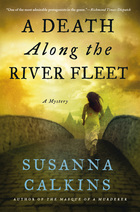 Certainly in A DEATH ALONG THE RIVER FLEET, when a young woman is found dazed and confused with blood on her clothes, there is immediate suspicion that she might be bewitched. But I wanted Lucy Campion, my chambermaid turned printer's apprentice, to be someone who was resourceful and intelligent, despite having little formal education. But it wasn’t just about creating a character who would use her wits and evidence to solve crimes; I wanted her to question how the community identified murderers in the first place. I also wanted Lucy to be someone who rejects the notion of providence as a means to explain murder. I wanted her to dismiss the idea that divine revelation could be a reliable way to identify a murderer—even if that meant challenging the expectations of her community. I’d like to think that Lucy would approve of the Detective’s Oath. This post was first published on the Bloody Good Read.
|
Susanna CalkinsHistorian. Mystery writer. Researcher. Teacher. Occasional blogger. Categories
All
Archives
May 2023
|

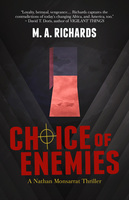
 RSS Feed
RSS Feed